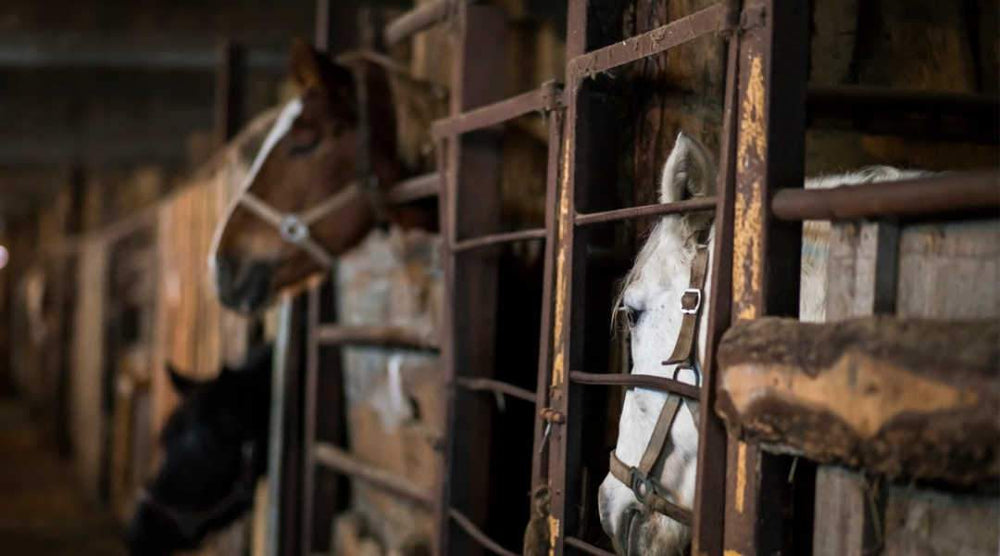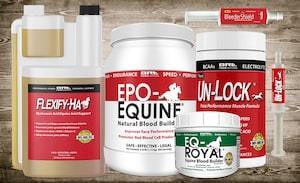
If your horse has ever had a respiratory problem, you know how worrisome it can be.
The causes of equine respiratory conditions can be viral, bacterial, or parasitic, but an unclean barn can also trigger allergic reactions in your horse's respiratory system.
Symptoms of Equine Respiratory Illness
Indications of respiratory distress can vary. Here are some signs to watch for:
- rapid and difficult breathing
- coughing
- wheezing
- gasping
- nasal discharge
- pain with breathing
- unusual head movement (shaking, lowering)
If your barn isn't clean enough, it might be causing or contributing to the problem.
What Allergens Are in Your Barn?
Unfortunately, normal barn chores themselves kick up lots of dust and debris. And all things airborne can enter your horse's lungs, including:
- dust, including bedding dust
- dirt
- hair
- insects
- bacteria
- mold and mildew
Your horse breathes in these allergens daily, and horses confined to stalls for long periods are at higher risk. Most dust particles can be seen and cleaned, but microscopic particles can easily reach the depths of a horse’s respiratory system.
Seems like you can't win for losing. But you can take steps to minimize risks.
Easy Ways to Reduce Barn Risk
While it's impossible to keep your barn completely free of these allergens, the following daily chores can keep them from triggering symptoms:
- Muck stalls.
- Sweep.
- Sweep/wipe down walls.
- Add fresh bedding.
How to Rid Your Barn of Dust
1. Clean Out. Rid your barn of anything you don't use regularly that collects dust, then keep what’s left clean and dust-free.
2. Consider bedding choices:
| MATERIAL | PROS | CONS |
| Hay or straw | Readily available; easy to use. | Dusty; molds easily when wet; harder to muck/remove |
| Wood shavings/chips | Absorbent; easy to handle; provides stable footing | Heavy when wet; disposal of soiled shavings can be difficult |
| Shredded paper or cardboard | Convenient; provides quality footing; absorbent | Easily molds; cleaning/replenishing must be consistent; heavy when wet |
| Peat Moss |
Good for horses with respiratory problems; easy to compost |
More expensive; causes film on bucket water; can discolor light horses |
| Pelleted bedding |
Convenient; absorbent; easy to muck; not as dusty |
Expensive; may require more |
3. Remove Your Horse
When doing barn chores such as sweeping, mucking stalls, or adding bedding, your horse should be removed to minimize risk. Allow enough time (about half hour) for dust to settle before bringing him back in.
4. Reduce Stall Time.
When your horse is stalled for long periods, the risk for respiratory ailments increases; turn him out as much as possible.
5. Check Ventilation.
Make sure your barn has adequate vents, windows, and doors. Whenever possible, leave barn doors open for air to circulate.
6. Add a Natural Anti-Inflammatory Supplement
You and your vet may want to consider an all-natural product to boost your horse’s immune system and reduce inflammation. EPO-Equine contains an anti-inflammatory complex that may help reduce your horse’s allergy-induced inflammation.
By following these simple steps, you can reduce your horse’s respiratory risk. Then you both can breathe a little easier.
Top trainers, owners and competitors rely on BRL Equine products to help their horses perform at their very best. You can get the same great results! Our all-natural equine nutritional supplements really work... guaranteed or your money back!





Also in Horse Tips and More
Top 10 Ways to Show Your Horse You’re Thankful For Him
November 01, 2021
View full article →
5 Ways to Prepare Your Barn For Summer
May 03, 2021
View full article →
Your New Spring Horse Health Checklist
March 12, 2021
View full article →